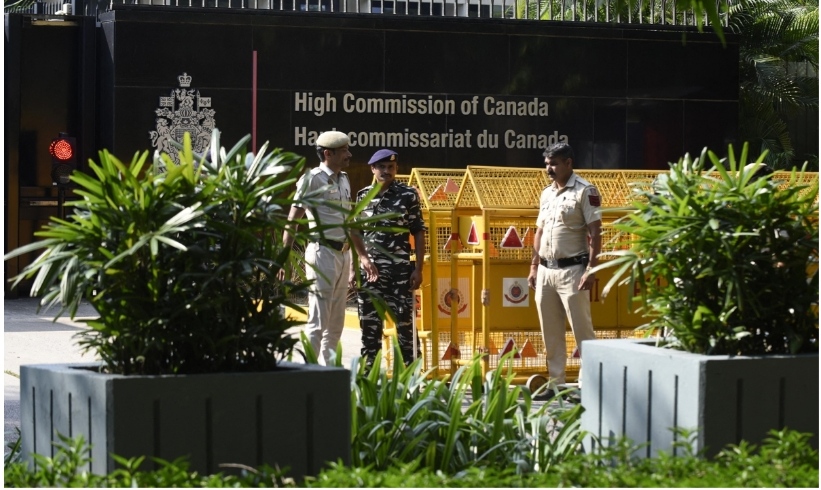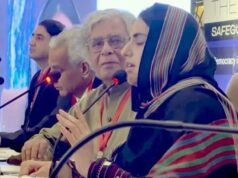Escalating India-Canada spat highlights Mismatch of Interests

Indian police take security measures around the Canadian Embassy after Canada and India mutually expelled their diplomats
In June of this year, Hardeep Singh Nijjar, a prominent Khalistani terrorist leader on the wanted list in India, staying in Canada but technically not a Canadian citizen (he is just married to a Canadian), was shot dead in Canada, most probably in an intergang rivalry
Canadian PM Trudeau right after his return from G20 meet, accused India of being involved in the assassination and kicked out an Indian diplomat, who Foreign Affairs Minister Mélanie Joly described as the head of the Indian intelligence agency in the country.
In response, India promptly booted out a senior Canadian diplomat based in India, who was said to be Coordinating all intelligence gathering activities in India, rejecting Canada’s absurd and motivated allegations.
Till date Canada has never shown its care for “ international law “ whenever USA has been accused of killing Iranian Generals, nuclear scientists, Iraquis and Afghanis.
In recent years, disputes between India and Canada have been centered around the Khalistani terror groups within the peaceful Sikh community in Canada. These terror groups opposes the Indian government and advocates for a separate Khalistan.
The Sikh community is a vibrant ethnic group in India, derived from Hinduism with a population of just over 20 million and works in the most exalted manner for Mother India. A Sikh has been the President of India, there have been scores of prominent freedom fighters from British Rules, dozens of Governors and Cabinet rank ministers and several Chiefs of Armed Forces and dozens of Army Commanders and equivalent.
In Canada, which is one of the largest immigrant settlements for Sikhs worldwide, the Sikh community wields significant political, commercial and economic influence. With blessing of some Powers who wish to see India weakened, there has been resurgence of the separatist Khalistan movement within this community, in recent years.
In Canada these terrorist Groups have been trying to take over all the Sikh establishments and make them anti India. The Coliation Canadian Govt under Trudeau has been providing tactic support to these separatist elements because if its desire to cling to power at any cost. This has become a major point of contention between India and Canada, severely impacting their bilateral relations. The ongoing tussle between the two countries has put India-Canada relations further at stake.
Observers generally believe that after the hard snub given to Canadian Prime Minister Justin Trudeau when he got audience with Indian Prime Minister Narendra Modi during the G20 summit in New Delhi, Trudeau is seething with impotent anger.
Now signals are quite clear of danger in the relationship between the two countries. Both countries are escalating mutual accusations and expelling diplomats, with Canada not realizing the vulnerability and limitations of the so-called Western Powers alliance system led by the US.
Western countries claim to be “defenders of human rights” and often criticize other nations for their human rights issues. Their sudden praise for India’s is primarily driven by their own geopolitical interests, rising economic growth of India and its military abilities. They know, only India can stand up to bring peace to the World. Thus they desire to include India in their anti-China military alliance but which India has refused, point blank though inwardly Western countries don’t like a rising India.
The West, especially the US, in recent years has been waving the banner of common values of democracy and freedom, attempting to develop comprehensive cooperation with India in order to contain China.
As a key member of the Western alliance and a long-standing ally of the US, Canada has played an important role for the US in establishing a so-called “rules-based international order” and promoting its Indo-Pacific Strategy.
Both India and Canada have expelled senior officials from each other, and if the India-Canada relationship continues to deteriorate, the US will try its best to quickly step in to “mediate.” After all, for the US, intervening in Canada’s affairs is a familiar and easy task.
However now even USA US fully aware that it cannot intimidate India anymore in any manner whatsoever and that Canada, in spite of its size is a non entity in World affairs.
In fact if Canada continues in this manner, then one day Khalistan will surely be established as a separate country but it will be on Canadian soil.



